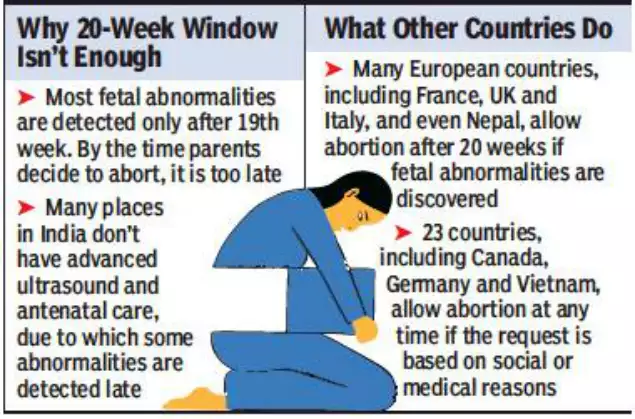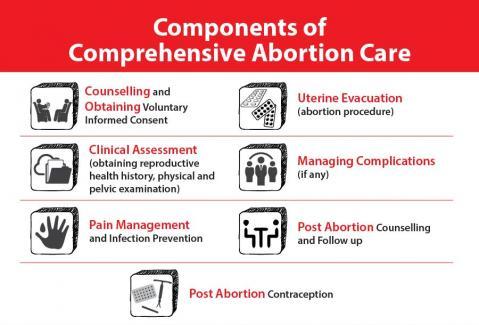Social Justice
Abortions
- 18 Apr 2020
- 10 min read
Why in News?
- In January 2020, the Union Cabinet has approved amendments to the Medical Termination of Pregnancy (MTP) Act, 1971 allowing women to seek abortions as part of the reproductive right and gender justice.
- The amendment has raised the upper limit of MTP from 20 weeks to 24 weeks for women including rape survivors, victims of incest, differently-abled women and minors.
- Abortion is defined as the termination of pregnancy by various methods, including medical surgery before the fetus is able to sustain independent life.
Medical Termination of Pregnancy (Amendment) Bill, 2020
- The Bill proposes the requirement of the opinion of one registered medical practitioner (instead of two or more) for termination of pregnancy up to 20 weeks of gestation (foetal development period from the time of conception until birth).
- It introduces the requirement of the opinion of two registered medical practitioners for termination of pregnancy of 20-24 weeks of gestation.
- It has also enhanced the gestation limit for ‘special categories’ of women which includes survivors of rape, victims of incest and other vulnerable women like differently-abled women and minors.
- It also states that the “name and other particulars of a woman whose pregnancy has been terminated shall not be revealed”, except to a person authorised in any law that is currently in force.
- Benefits:
- It expands the access of women to safe and legal abortion services on therapeutic, eugenic, humanitarian or social grounds.
- It is a step towards the safety and well-being of the women and many women will be benefited from this.
MTP Act, 1971
The idea of terminating a pregnancy cannot originate by choice and is purely circumstantial. Under the law (section 3 of the MTP Act 1971), the doctor can perform an abortion in the following situations:
- If the pregnancy would be harmful to the life of the patient or affects her physical or mental health. The doctor will need to consider the circumstances of the patient to figure out if the pregnancy will harm her mental health, on a case to case basis.
- If there is a good chance that the child would suffer from physical or mental abnormalities which would leave him or her seriously handicapped.
- If pregnancy occurred as a result of a failure of contraception (but this is only applicable to married women).
- If pregnancy is a result of sexual assault or rape.
Conditions for Termination of Pregnancy
- If the pregnancy has not exceeded 12 weeks, only one doctor needs to be satisfied that the conditions have been fulfilled.
- If the pregnancy has exceeded 12 weeks and is below 20 weeks (now amended to 24 weeks), two doctors need to be satisfied that the conditions have been fulfilled.
- The gestation period does not matter if a doctor feels that an immediate abortion must be conducted to save the life of the patient.
- The doctor who determines if it is necessary to perform an abortion and performs it needs to be a ‘registered medical practitioner’ under the law.
Illegal Abortions
- Abortion of under 4 to 5 months pregnancy- The punishment for getting an illegal abortion is jail time of up to 3 years and/or fine.
- Both patients and doctors are considered to have committed a crime unless it fulfills the above condition.
- Abortion of over 5-month pregnancy- If abortion takes place when movements of the foetus can be sensed, the punishment is jail time of up to 7 years and fine unless it was done in good faith to save the life of the patient.
- Abortion without consent - If anyone else forces the pregnant woman to have an abortion or performs one without her agreeing to it, the punishment is jail time of up to 10 years and fine.
- Abortion resulting in death - If the patient dies because of a botched abortion or an abortion carried out by an unskilled person, the doctor who conducted the operation can be punished with jail time of up to 10 years and fine.
- If the abortion was conducted without the patient’s permission, the punishment is a jail for life.
- Intentionally causing the death of a foetus can also be prosecuted under other provisions of the Indian Penal Code, 1860 under which the punishment can extend up to 10 years.
Consent of a Person
- The doctors have a duty to get the consent of a pregnant woman in order to perform the abortion.
- If a woman is below 18 (a minor) or suffering from a mental illness, the doctors have a duty to get the guardian’s permission as well.
- If a doctor performs an abortion without consent, he or she can be punished with a jail term extending up to 10 years and fine.
Steps Taken by the Government for Safe Abortions
- The Government provides safe and comprehensive abortion care (CAC) services to women in health facilities under RMNCH+A (Reproductive, Maternal, Newborn, Child and Adolescent Health) program of National Health Mission.
- Guidelines on Comprehensive Abortion care services and Medical Methods of Abortions (MMA) have been provided to all the States.
- Provision of funds to States/ UTs for the operationalization of safe abortion services at health facilities.
- Provision of Funds to States to plan and implement comprehensive “Information Education & Communication/ Behaviour Change Communication (IEC/BCC)” activities for maternal health including safe abortion care.
- Capacity Building of Medical officers in Safe Abortion Techniques and of ANMs, ASHAs and other functionaries to provide confidential counseling for safe abortion and promote post-abortion care.
- Training of ASHAs to equip them with skills to create awareness on Comprehensive abortion care issues in women in the community and facilitate women in accessing services.
- Certification to private and NGO sector facilities to provide quality Comprehensive Abortion Care services.
- Supply of Nischay Pregnancy detection kits to sub-centers for early detection of pregnancy.
Issues with the Current Abortion Laws
- According to a 2015 study in the Indian Journal of Medical Ethics, 10-13% of maternal deaths in India are due to unsafe abortions (the third leading cause of maternal death in our country).
- Lack of access to safe abortion clinics, particularly public hospitals, and stigma and attitudes toward women, especially young, unmarried women seeking abortion, contribute to this.
- Abortion is not allowed post 20 weeks of pregnancy, which restricts the better detection and hence, abortion of foetuses with abnormalities like Down Syndrome, Congenital malformations or others.
- The law does not accommodate non-medical concerns over the economic costs of raising a child, effects on career decisions, or any other personal considerations.
Way Forward
- Access to legal and safe abortion is an integral dimension of sexual and reproductive equality, a public health issue, and must be seen as a crucial element in the contemporary debates on democracy that seeks to provide the just society that abhors all sort of discrimination.
- The silence around unsafe abortion leads to deaths of women and hides important problems that lie at the intersection of these concerns, such as the formidable barriers for adolescent girls to access reproductive health services, including abortion services. The right to safe abortion is an important facet of women’s right to bodily integrity, right to life and equality and needs to be protected.








